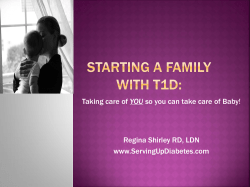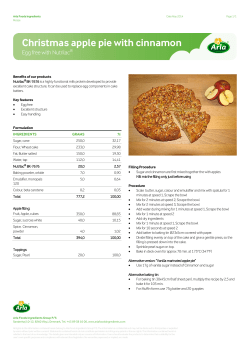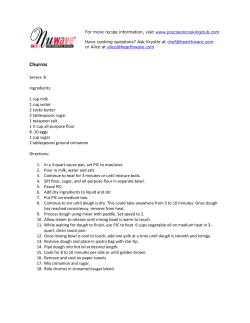
Got diabetes? Thinking about having a baby? U.S. Department of
Got diabetes? Thinking about having a baby? U.S. Department of Health and Human Services Centers for Disease Control and Prevention Diabetes and Pregnancy Diabetes is a condition in which your body cannot use sugars and starches (carbohydrates) from food to make energy. As a result, your body collects extra sugar in your blood. The extra sugar can lead to heart, eye, and kidney damage. If you are pregnant, the extra sugar increases the chances for problems with your baby, including birth defects. Diabetes that occurs before pregnancy can be either type 1 or type 2. Plan your pregnancy and control your diabetes If you are a woman with diabetes, you still can have a healthy baby. You need to take extra care before and during your pregnancy. Talk with your doctor about whether it is safe for you to become pregnant. Ask your doctor what you need to do before you get pregnant, how to prevent pregnancy while you are getting your blood sugar under control, and how to keep your blood sugar under tight control both before and during your pregnancy. If you find that you are pregnant before your blood sugar is under control, the best way to care for your baby is to start now to control your blood sugar. Talk with your doctor to learn how. 1 Diabetes can harm you and your baby A woman who does not have control of her diabetes and gets pregnant has a greater chance of having a baby with a birth defect than a woman without diabetes. Diabetes that is not controlled can • Cause your baby to have serious birth defects. If your blood sugar is out of control, it can lead to health problems and serious birth defects, such as those of your baby’s brain, spine, and heart. • Increase your chances for stillbirth or miscarriage. • Cause your baby to be born early. A baby born too early can have breathing problems, heart problems, bleeding into the brain, intestinal problems, or vision problems. • Make your baby grow very large (weigh more than 9 pounds), which in turn can lead to problems with the delivery for you and your baby. A large baby born through the birth canal can injure nerves in his shoulder; break her collarbone; or, rarely, 2 have brain damage from lack of oxygen. You might have to have a cesarean section (an operation to get the baby out through your abdomen), which usually means a longer recovery time for you after your baby is born. • Cause your newborn to have quickly changing blood sugars after delivery. Your baby’s doctor will watch your baby for low blood sugar after birth and treat it if needed. Other problems that sometimes happen with diabetes • You may also develop preeclampsia (pree-e-klampsee-ah). This means you have protein in your urine and high blood pressure. Preeclampsia can harm you by causing you to have seizures or a stroke. It also might cause your baby to be born early. • Very large babies are more likely to become overweight or obese during childhood and adolescence. Such obesity can lead to type 2 diabetes. Controlling your diabetes before and during your pregnancy will help prevent such problems as birth defects, prematurity, miscarriage, and stillbirth. If you find that you are pregnant before your diabetes is controlled, taking steps now to control your blood sugar is the best way to care for your baby. 3 Have a healthy pregnancy and a healthy baby 5 things you can do to help... 1 Plan your pregnancy • Getyourbodyreadytobepregnant. • Seeyourdoctorbeforeyouplantogetpregnantand as often as recommended during your pregnancy. You might have to take medicines or change your current medicines, including your medicine for diabetes. • Controlyourbloodsugarbeforeandduring pregnancy to reduce your chance of having a baby with a birth defect. • Workwithyourdoctortopreventproblemsorto catch them early. 2 Eat healthy foods and stay active • Workwithadietitianordiabeteseducatortodevelop a diabetes meal plan for yourself. Learn what to eat to keep your blood sugar under control. • Stayactivetohelpkeepyourbloodsugarunder control. Exercise regularly—before, during, and after pregnancy. Moderate exercise, such as a brisk walk, 30 minutes a day, 5 days a week is a good goal if your doctor is okay with it. 4 3 Take your medicines • Follow your doctor’s advice. • Take your medicines as directed, including insulin* (in-suh-lin) if ordered by your doctor. 4 Monitor your blood sugar often • Be aware that your blood sugar can change very quickly, becoming too high or too low. What you eat, how much you exercise, and your growing baby will change your blood sugar many times during the day. • Check your blood sugar often— as directed by your doctor any time you have symptoms. (See pages 8–9.) • Know what blood sugar levels mean. Learn how to adjust what you eat; how much you exercise; and, if prescribed, how much insulin to take depending on your blood sugar tests. 5 Control and treat low blood sugar quickly • Check your blood sugar right away if you have symptoms. (See page 9.) • Treat low blood sugar quickly. Always carry with you a quick source of sugar, like hard candy or glucose tablets. • Wear a medical alert diabetes bracelet. * Insulin is usually made in the body and helps change sugars and starches into energy. If the body doesn’t make enough insulin or can’t use the insulin it makes, extra insulin is given in a shot. 5 Stay healthy after the birth of your baby Take care of yourself as you begin to take care of your baby. ✓ Monitor and control your blood sugar. ✓ See your doctor regularly. Usually twice a year, your doctor will check your A1C (a blood test that shows how well your blood sugar has been controlled during the past 3 months). ✓ Take your medicines. ✓ Control and treat low blood sugar quickly. ✓ Continue to eat healthy foods. ✓ Stay active. Exercise 30 minutes a day 5 days a week. ✓ Talk with your doctor about your plans for more children BEFORE your next pregnancy. ✓ Watch your weight. Six to twelve months after your baby is born, your weight should be back down to what you weighed before you got pregnant. If you still weigh too much, work to lose 5% to 7% (10 to 14 pounds if you weigh 200 pounds) of your body weight. ✓ Plan to lose your weight slowly. This will help you keep it off. 6 Tear out page and keep it handy! Monitoring Your Blood Sugar The American College of Obstetricians and Gynecologists (ACOG) says you should try to keep your blood sugar below these levels: ACOG Recommendations The levels my doctor recommends Before meals 95 mg/dL or lower __________________ 1 hour after eating 130 mg/dL or lower __________________ 2 hours after eating 120 mg/dL or lower __________________ Blood sugar is measured in milligrams/deciliter (mg/dL) Your doctor might recommend different blood sugar levels. Ask your doctor to write in the chart above the levels you should have. High blood sugar Your blood sugar is high when the numbers are 130 mg/dL or higher. High blood sugar can • Make you thirsty • Make it hard to pay attention • Cause headaches • Blur your vision • Make you go to the bathroom often to urinate (pee) • Make you feel weak or tired • Cause yeast infections Talk with your doctor if you notice any of these signs or symptoms. Call your doctor if your blood sugar is greater than __________________. (Ask your doctor to write the level.) My doctor’s name: _______________________________________ Phone number: __________________________________________ Low blood sugar Your blood sugar is low when the numbers are 70 mg/dL or less. Low blood sugar is also called hypoglycemia (hi-poh-gli-see-me-ah). Low blood sugar can • Makeyoufeelhungry • Makeyousweat • Causeheadaches • Causeweakness • Makeyoufeeldizzyorshaky • Makeyoufeelanxious or cranky • Causeyoutofeelconfused • Makeyoulookpale • Makeyourheartfeellike it’s beating too fast If you notice any of these signs or symptoms, check your blood sugar. If it is low, eat or drink a source of quick sugar—like a piece of hard candy or 4 ounces of fruit juice, skim milk, or soft drink (not diet). Check your blood sugar again in 15 minutes. If it’s not better, eat or drink a sourceofquicksugaragain.Whenyoufeelbetter,haveaproteinsnack like cheese and crackers or half a peanut butter sandwich. Talk with your doctor if you have two or more low blood sugars in 1 week. Call your doctor if________________________________________ (Ask your doctor to fill in.) Remember! Take care of yourself! ✓ See your doctor regularly ✓ Check your blood sugar as directed ✓ Take your medicine as directed ✓ Eat a healthy diet ✓ Exercise and be active Breakfast After Before Breakfast Before After Lunch After Before Lunch After Before Dinner Before After Dinner Before After Bedtime Bedtime Other Other Medicines you take Medicines you take * Comments:Reportanythingthatmighthavemadeachangeinyourbloodsugar,forexample:mealsandcommentsaboutcertainfoods (1/2 cup of rice = blood sugar); exercise (walked fast x 30 min); illness (fever and sore throat); or stress (concern about husband getting laid off ). Comments* Blood sugar readings Time Date Comments* Blood sugar readings Time Date Circle blood sugar result each time you’re above or below your target. Add comments on diet, exercise, illness, or stress. Copy the chart as many times as you need it to keep track of your blood sugar. Diabetes Logbook: Week of http://www.cdc.gov/ncbddd/bd/diabetespregnancy.htm 800–CDC–INFO (800–232–4636) flo@cdc.gov Order Number: 21-1096 http://www2.cdc.gov/ncbddd/faorder/orderform.htm CS210599-B
© Copyright 2025









